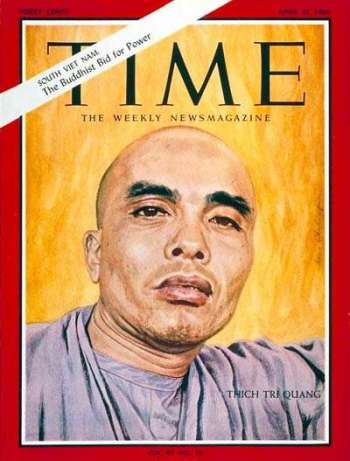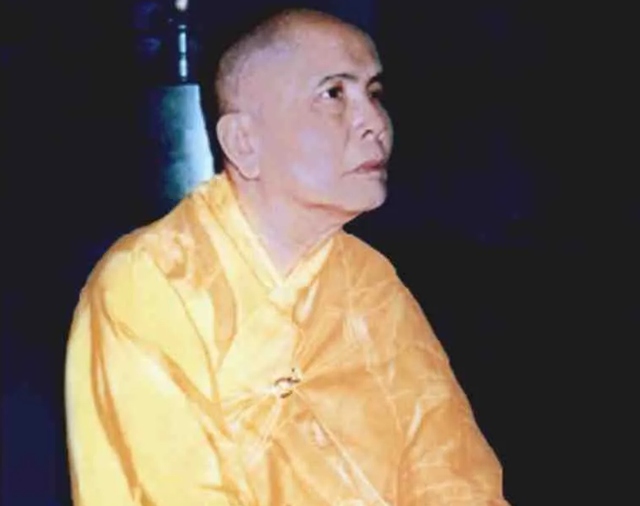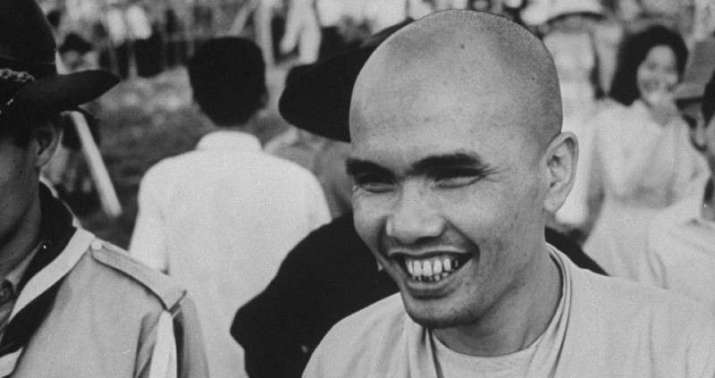Thich Tri Quang, a Buddhist monk who rose to a position of political power during the Vietnam War, has passed away in Hue, central Vietnam at the age of 95. He died on 8 November, according to an announcement by Tu Dam Temple where he was residing. A cause of death was not given. The monk was best known as a leader of a predominantly Buddhist uprising in 1963 that unseated the first president of South Vietnam, Ngo Dinh Diem.
 From time.com
From time.comTri Quang (Thich is a religious title similar to “venerable”) was born Pham Quang on 21 December 1923 in the province of Quang Binh, and was ordained in 1936 at the age of 13. From 1963–66, he played a key role in Vietnamese politics. In 1966, in grey robes and a steely gaze, he graced the cover of Time magazine, with the banner, “The Buddhist Bid for Power” above his head. The cover story in Time described him as, “Lean, well-muscled, with a sensual electricity in every gesture and blazing eyes that can mesmerize a mob, Thich Tri Quang, 42, has long been South Viet Nam’s mysterious High Priest of Disorder.” (Time)
The article stated: “Wily and ruthless, Delphic and adept, he is the best of breed of a new kind of back room bonze,”(an alternative word for a Buddhist monk). “In the murky world of Oriental mysticism and Saigon’s immemorial intrigue, these robed and shaven men have emerged as the new Machiavellis of the Vietnamese political scene. Tri Quang is unquestionably their prince.” (Time)
At a time when many Westerners were only beginning to be curious about Buddhism, Tri Quang represented a unique side of the religion. He was seen as both a proponent of the country’s Buddhist majority and as a radical dissident. In a country where Buddhists often sought ways of transcending political labels and the growing outside pressures from China in one direction and the United States in the other, he was accused at times of being a communist and at other times of being an anti-communist.
Edward Miller, a Dartmouth College professor of history said: “When it comes to the Vietnam War. I think that Americans and others always tend to try to fit everything that happened . . . into this Cold War framework, where it’s all about communism or anti-communism. In the case of Tri Quang, I think the key to understanding him is that he was first and foremost a Buddhist and a nationalist.” (The Columbian)

Thich Tri Quang. From dantri.com.vn
Following the ouster of Diem in 1963, Tri Quang continued his political involvement in South Vietnam. “We perceived that he had great influence over Buddhist opinion within South Vietnam,” said James McAllister, a scholar of the Vietnam War at Williams College in Massachusetts who has written extensively about Tri Quang, and hoped he would “rally South Vietnam to fight against communism.” (Washington Post)
However, Tri Quang did not fit into the anti-communist mold as American politicians had hoped. Instead, he led further Buddhist uprisings against the government of South Vietnam, including that of American-supported Nguyen Cao Ky. That uprising failed, however, and Tri Quang followed with a hunger strike. He was later arrested and placed under house arrest. After 1975, Tri Quang lived at An Quang Pagoda in Ho Chi Minh City and then Tu Dam Pagoda in Hue, maintaining a low political profile until his death this month.
See more
Buddhist monk who used political might during Vietnam dies (The Columbian)
Thich Tri Quang, Buddhist monk who wielded political might during Vietnam War, dies at 95 (The Washington Post)
Related news from Buddhistdoor Global
Revered Buddhist Teacher Thich Nhat Hanh Turns 93
Monastics and Lay Buddhists in Vietnam Register for Blood and Organ Donation
Vietnam Hosts 16th United Nations Day of Vesak Celebrations
Vietnam Authorities Clamp Down on “Exorcism” Rituals at Buddhist Pagoda
Related features from Buddhistdoor Global
Buddhistdoor View: Buddhism in Southeast Asia: a Catalyst for Civic Exchange
Monastics in White: The Medical Monks and Nuns of Vietnam
Filling the Emptiness with Love at the Duc Son Orphanage
Buddhistdoor View: Honoring the Lessons of Martin Luther King Jr. for Today’s World

















